
Detailed Guide to Healthcare Software Development
In an era of rapid digital transformation, healthcare software development plays a pivotal role in bringing new technological advancements to the medical field.
From electronic health records to telemedicine platforms, healthcare software is revolutionizing the way we access, manage, and deliver healthcare services.
This in-depth guide explores the complexities of healthcare software development and examines its critical role in improving patient care, streamlining operations, and advancing medical research and innovation. Join us as we uncover the vital aspects, challenges, and opportunities of healthcare software development.
Contents
- What are healthcare software solutions?
- The current state of the healthcare software development market
- Trends in the healthcare software development market industry
- Key types of healthcare software
- Benefits of software development for healthcare industry
- How to conduct custom healthcare software development projects?
What are healthcare software solutions?
Healthcare software solutions encompass a wide range of digital tools designed to improve the delivery and management of healthcare.
They include electronic health record software for secure storage of patient data, telemedicine platforms for remote care, and medical billing software for administrative tasks. They also include healthcare analytics to use data to make informed decisions.
In essence, healthcare software solutions can be found at virtually every touch point between patients and healthcare organizations, and they continue to play a pivotal role in improving patient care and operational efficiency within the healthcare industry.
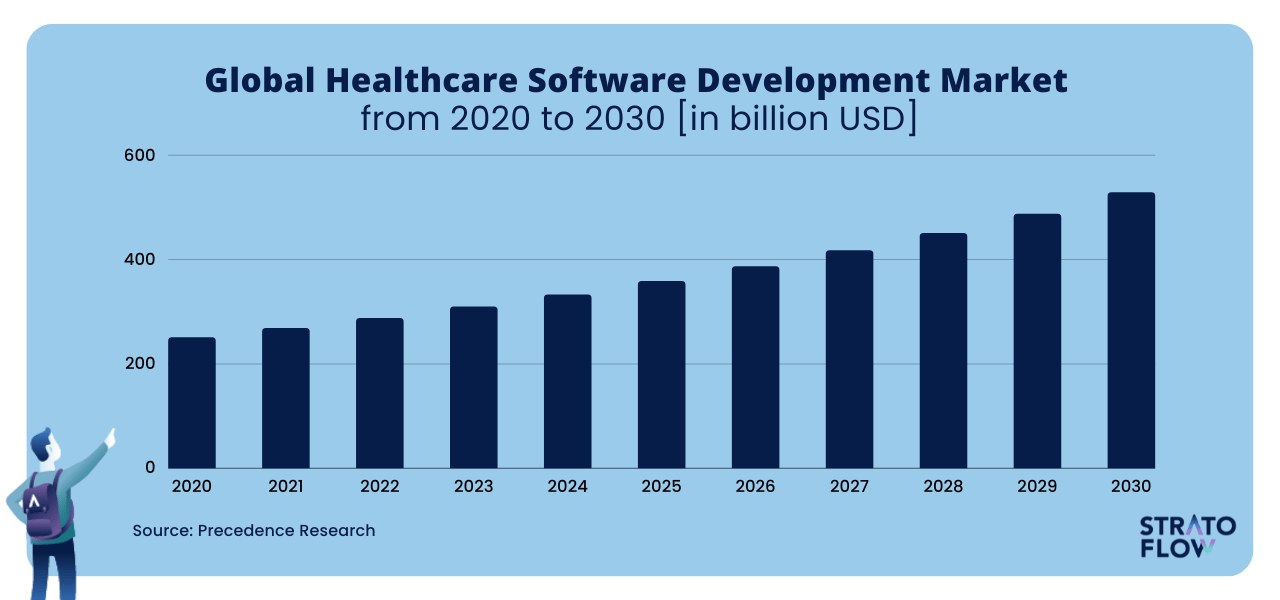
The current state of the healthcare software development market
The healthcare software development market is experiencing significant growth as the market undergoes digital transformation.
Just how significant?
The healthcare software industry is expected to grow to $104.1 billion by 2030, representing a 10.9% CAGR (compound annual growth rate). Additionally, the global healthcare SaaS market size was valued at USD 12.5 billion in 2020 and is projected to expand at an even more impressive CAGR of 19.5% from 2021 to 2028.
The companies have already noticed the digital shift in the healthcare industry as both the public and private sectors in Europe and the States have sped up new digital healthcare initiatives. According to the latest research data, venture capital investments in digital health in the US accounted for $3.4 billion in Q1 2023.
Trends in the healthcare software development market industry
The healthcare industry is undergoing a transformative evolution driven by several key trends.
First and foremost is the rapid expansion of telehealth and remote care – a trend turbocharged by the COVID-19 pandemic, which is making healthcare more accessible and convenient than ever before.
In addition, healthcare analytics and data-driven decision-making are enabling providers to derive insights from patient information to improve both care outcomes and operational efficiency. Finally, the increasing integration of mental health services into overall care underscores the industry’s commitment to holistic patient wellness.
Here are three key trends that will shape the modern healthcare industry in 2023:
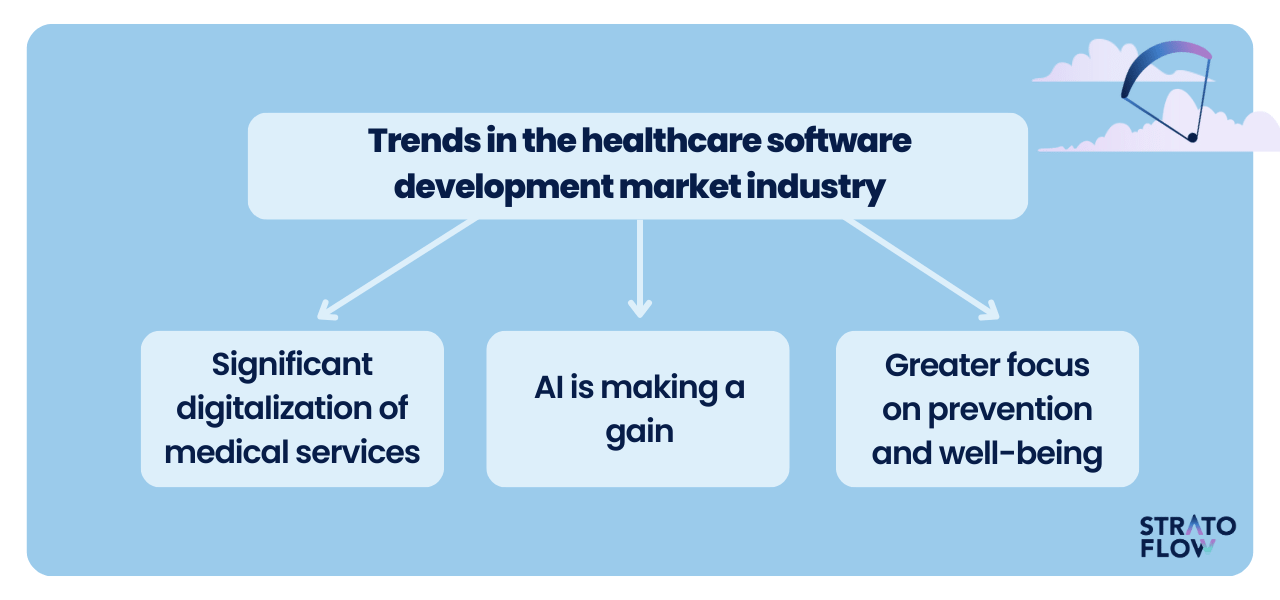
Significant digitalization of medical services
The digitization in healthcare industry has become a major focus for healthcare providers worldwide.
The majority of healthcare providers in global markets are now investing heavily in digital health. The COVID-19 pandemic has further accelerated the adoption of digital health and telehealth, with nearly two-thirds of patients expected to access healthcare through a digital front-end by 2023. A Deloitte report on the other hand showed that consumers engaging in virtual visits with their clinicians jumped from 15% in 2019 to 28% in 2020.
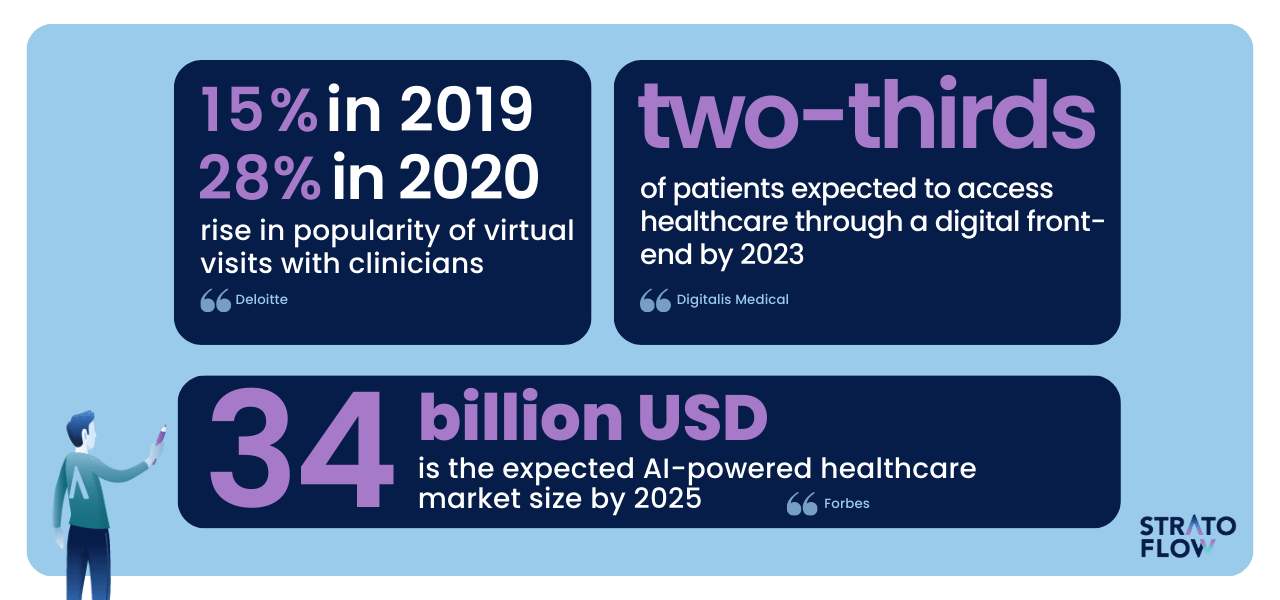
AI is making a gain
Digital health technology and artificial intelligence (AI) are transforming the healthcare landscape.
The AI-powered healthcare market is expected to exceed $34 billion by 2025. According to Forbes, the healthcare AI market is also experiencing rapid growth. The global AI in healthcare market size is expected to grow from just under $5 billion in 2020 to $45.2 billion by 2026. According to the PWC Health Research Institute, nearly 40% of executives from healthcare organizations say their organizations already invest in AI, machine learning, and predictive analytics.
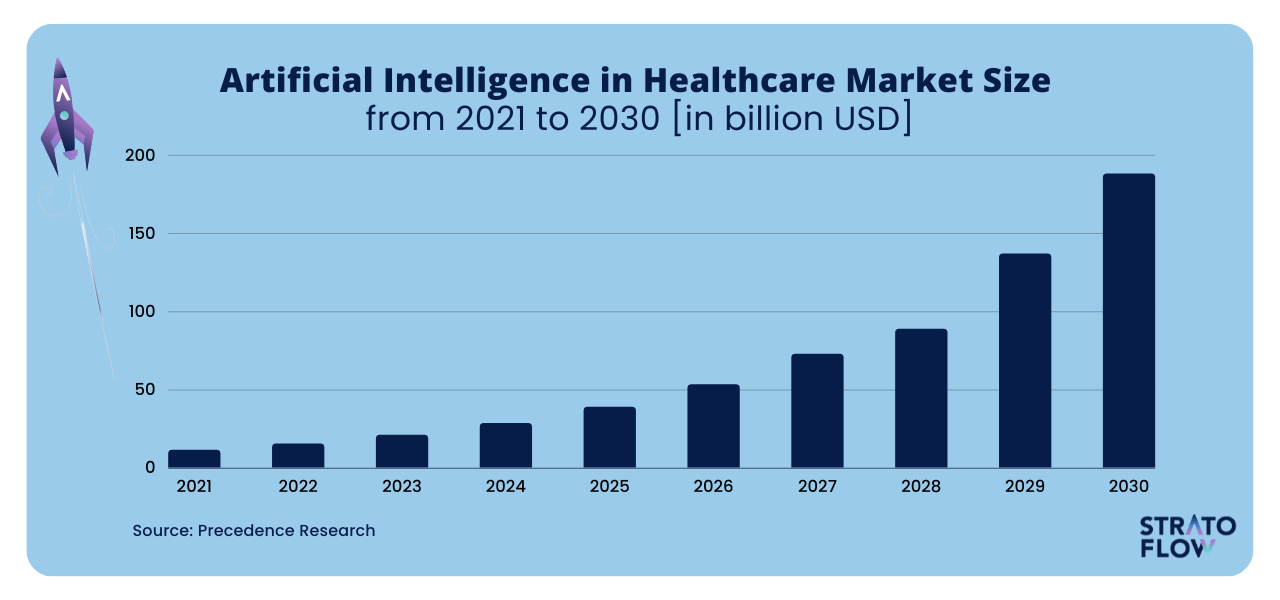
Greater focus on prevention and well-being
We tend to associate healthcare with treating the sick.
In recent years, however, the healthcare industry has seen a significant shift in its approach, with a growing emphasis on prevention and improving overall well-being.
As consumers become more aware of prevention, wellness, and mental health, they are actively seeking guidance online. This has created the demand for digital services such as health monitoring, stress reduction, and early diagnosis to play a role in mainstream healthcare systems.
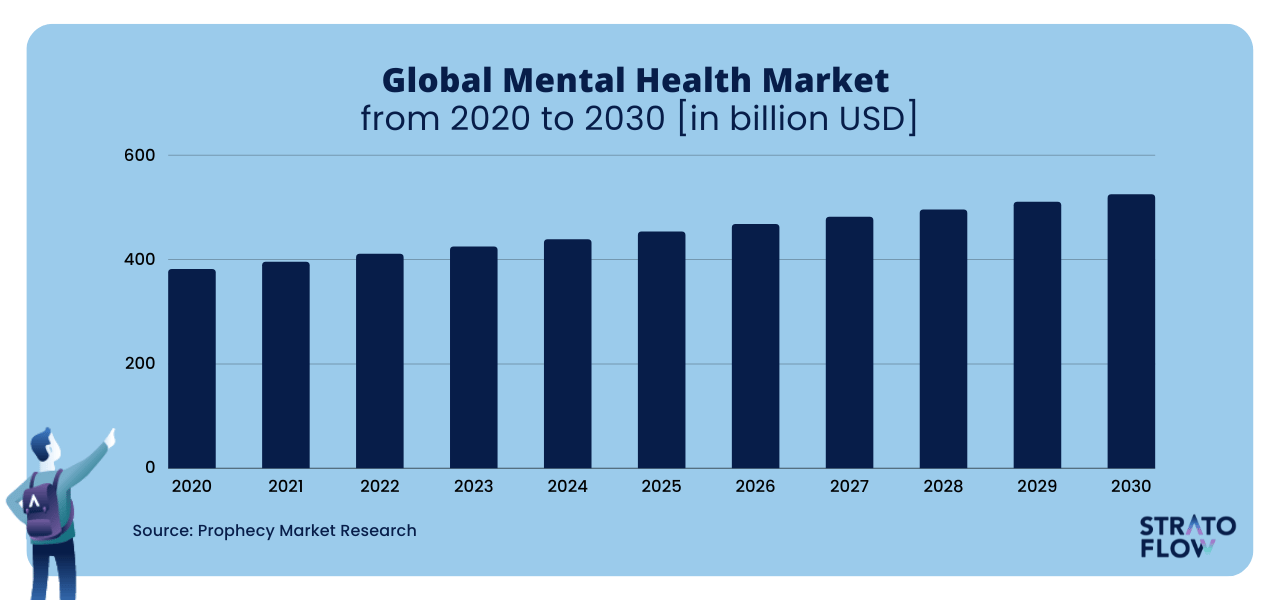
Key types of healthcare software
Custom software applications can be found in a surprising number of places in the healthcare industry. From managing sensitive patient data and hospital resources to supporting clinical decisions and treatment plans, modern technology improves nearly every aspect of how healthcare organizations operate. Let’s take a quick look at five of the most important types of healthcare software.

Electronic Health Record (EHR) software
Electronic Health Record (EHR) software is the digital backbone of modern healthcare, consolidating patient health data and providing secure electronic access to healthcare providers.
It plays a critical role in improving patient care by providing an accurate, real-time snapshot of a patient’s medical history, diagnoses, treatments, and test results. EHRs improve care coordination, reduce errors, and empower patients with access to their own health information.
Health Information Exchange (HIE) software
Health Information Exchange (HIE) systems bridge the gap between different healthcare providers and organizations by securely sharing patient health information.
They are critical to ensuring continuity of care and more informed decision-making across multiple healthcare settings. HIE systems are essential for reducing duplicate testing, improving patient outcomes, and promoting seamless care transitions.
Clinical Decision Support Systems (CDSS)
Next on our list is Clinical Decision Support Systems (CDSS) software, which helps healthcare professionals make clinical decisions by providing evidence-based recommendations, alerts, and insights.
By analyzing patient data and comparing it to clinical guidelines, CDSS improves patient safety, supports best practices, and minimizes medical errors. It is an essential tool for ensuring that healthcare decisions are based on the latest medical evidence.
Medical Database Software Systems
We should also mention Medical Database Software Systems, which serve as the fundamental repository for healthcare data, including patient records, treatment histories, and diagnostic information.
These databases are essential for data management, integrity, and security. They support medical research, healthcare analytics, and informed decision-making by providing a comprehensive view of patient histories and a secure, accessible storage solution for healthcare data.
Hospital Management Software
Finally, let’s talk about Hospital Management Software Systems – comprehensive digital solutions that automate administrative and operational processes in healthcare facilities.
They centralize patient data, streamline tasks such as scheduling and billing, and provide robust reporting tools. This software ensures efficient resource management, accurate financial transactions, and data security, ultimately improving patient care coordination and operational efficiency in healthcare organizations.

Benefits of software development for healthcare industry
Let’s face it.
Healthcare organizations around the world wouldn’t invest millions of dollars in custom software solutions if they didn’t see tangible benefits.
And those benefits are not limited to improving the patient experience, but also include other equally valuable aspects of running a business. Let’s look at ten of the most important benefits of modern digital solutions for the healthcare industry:
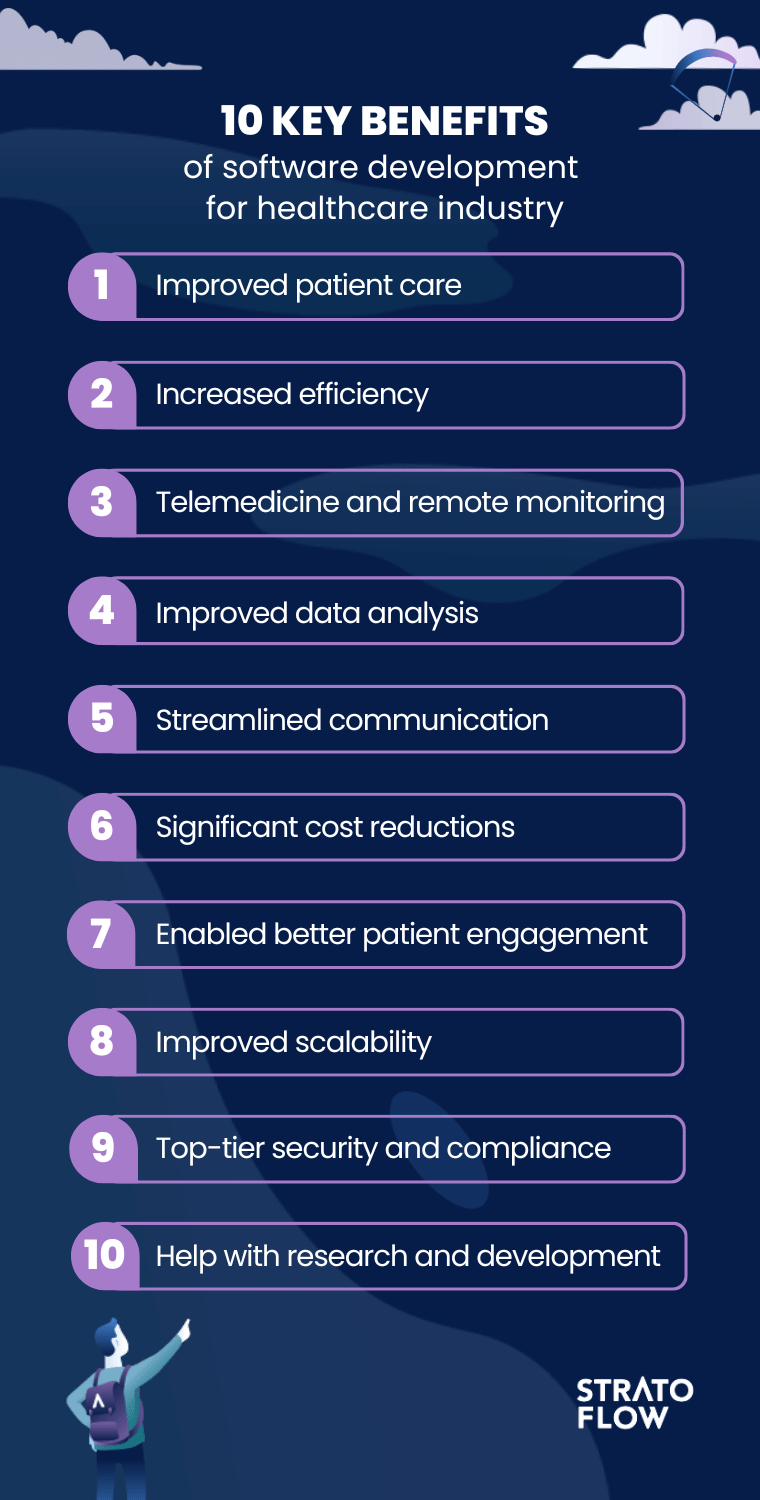
Improved patient care
At the heart of every healthcare software solution is the well-being of the patient.
Custom healthcare software solutions are critical to improving patient care through personalized treatment plans, efficient data management through EHR systems, and integration of remote health monitoring.
These solutions also automate alerts, support clinical decision-making, and enhance communication among care teams. Patient engagement and education are facilitated through portals and resources, while data analytics support predictive care. Customized software is a cornerstone in delivering precise, patient-centered care, ultimately leading to improved health outcomes and greater patient satisfaction.
Increased efficiency
Custom healthcare software development also improves efficiency and resource allocation by streamlining workflows, automating administrative tasks, and integrating data sources.
It enables real-time tracking of resources and predictive analytics for planning to improve the day-to-day operations of healthcare organizations. It also optimizes supply chains and supports data-driven decision-making, ultimately reducing costs while improving patient care and healthcare resource utilization.
[Read also: Future of Business Intelligence: Emerging Trends in 2023]
Telemedicine and remote monitoring
As mentioned in the first point, healthcare software applications play a key role in enabling telemedicine and remote monitoring.
Telemedicine solutions tailored to specific healthcare needs to facilitate remote consultations, allowing patients to access medical advice, e-prescribing software and monitoring from the comfort of their own homes. This not only increases access to healthcare, but also reduces the burden on physical healthcare facilities, ensuring that resources are allocated efficiently.
This was particularly valuable during the COVID-19 pandemic, when much of the routine medical consultation with patients was conducted remotely.
Improved data analysis
Software development for healthcare providers can significantly improve analytics by leveraging electronic medical records (EMRs) and advanced data processing capabilities.
EMRs serve as digital repositories for patient information, enabling efficient data collection, storage, and retrieval. This medical data, when integrated into modern healthcare software, provides several benefits, from enabling healthcare facilities to maintain comprehensive and up-to-date patient histories, to using advanced algorithms and machine learning models to process patient data, to identifying disease trends and predicting patient outcomes to optimize resource allocation.
Streamlined communication for healthcare professionals
Custom healthcare software development improves healthcare communication by creating a secure, centralized hub for real-time information exchange among healthcare professionals.
This facilitates cross-departmental collaboration, ensures timely sharing of patient updates and test results, and integrates telemedicine capabilities for remote consultations. Custom software also streamlines documentation, automates scheduling, and integrates secure messaging to reduce errors and improve patient care coordination.

Significant cost reductions
As in other industries, custom software solutions can significantly reduce costs in healthcare organizations.
They improve resource management by automating hospital administrative tasks, streamlining workflows, and providing real-time visibility into resource utilization. Predictive analytics built into custom software enable proactive resource planning, while the aforementioned telemedicine and remote monitoring capabilities reduce the need for physical resources in healthcare facilities.
All of this enables healthcare organizations to provide quality care while effectively managing resources and minimizing operational costs.
Enabled better patient engagement
Custom healthcare software also enables organizations to increase patient engagement through patient portals that provide online access to health records, educational resources, and personalized health plans.
These tools empower patients to actively manage their health, access information, and participate in informed decision-making. In addition, features such as appointment scheduling, medication reminders, and integration with wearables increase patient involvement in their care. Finally, the ability to provide feedback and complete satisfaction surveys allows healthcare organizations to continually improve services based on patient insights.
Improved scalability
Any robust healthcare software solution must be scalable, as scalability is a critical factor in the industry, especially when it comes to electronic health record (EHR) systems.
Healthcare organizations must be able to seamlessly expand their EHR systems as the volume of patient medical records and data grows over time. Scalable custom software ensures that as new medical facilities are added or existing ones expand, the EHR system can accommodate the increased data storage and processing requirements without compromising high software performance or data integrity. This translates into improved efficiency and optimized costs for all healthcare stakeholders.
Top-tier security and compliance
Security and compliance are also paramount in healthcare software development projects.
Patient privacy is a top concern, and strict regulations such as HIPAA govern its handling. Custom software must employ robust security measures to prevent cyber-attacks and ensure data integrity. Compliance standards also facilitate interoperability, patient consent management, and audit trails to track data access.
Help with research and development
Finally, custom software solutions in the healthcare industry act as catalysts for innovation in drug development and therapies.
As we’ve mentioned, they efficiently manage and analyze vast amounts of patient data. As a result, researchers can uncover valuable insights and correlations. The impact of custom software also extends to drug modeling and simulation, providing a virtual testing ground to refine treatment approaches. In essence, custom software is fueling the search for new drugs and therapies by revolutionizing data-driven research, making healthcare more personalized, and accelerating the path to innovative medical breakthroughs.

How to conduct custom healthcare software development projects?
As we can see, custom software is highly advantageous in healthcare. If you don’t want to be left behind, you must strive to deliver only the best digital experience.
And that’s our mission at Stratoflow – to deliver cutting-edge software to our clients and enable our engineering team to stay on the cutting edge of innovation.
Let’s see what our software developers focus on when creating the best custom software solutions for the healthcare industry:
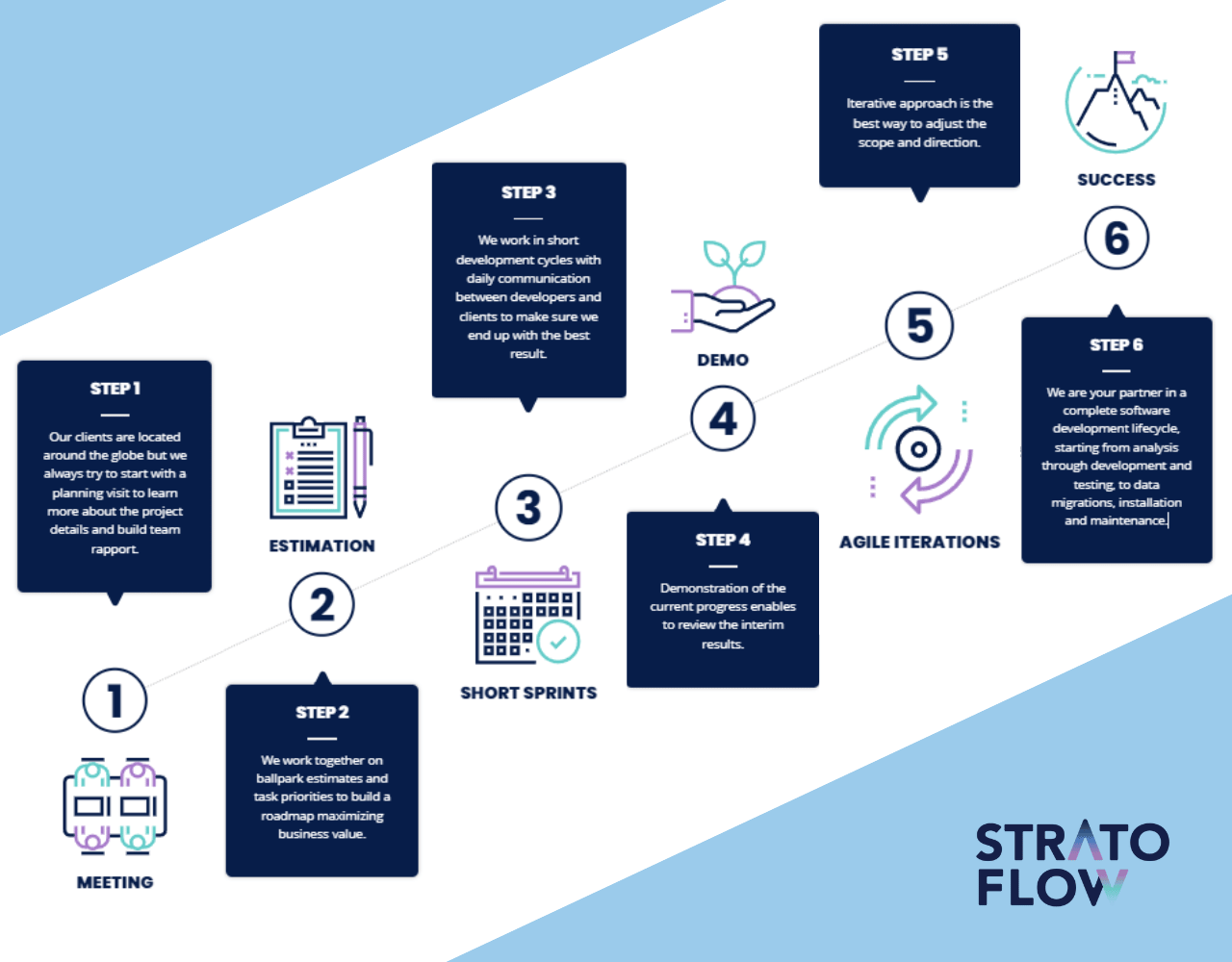
Put emphasis on software performance
In today’s world, performance is everything, and the healthcare industry is no different.
Reliable and efficient software ensures timely access to critical patient information, supports accurate diagnosis and treatment, streamlines administrative tasks, and protects sensitive patient data, ultimately leading to better outcomes and improved overall healthcare delivery.
When designing solutions for healthcare organizations, Stratoflow developers always take an approach that maximizes the scalability and performance of the software to deliver the best possible experience and value.
[Read also: Benefits of Open-Source Software for Developers, Managers and Business]
Treat data security as your top priority
Patient data is extremely sensitive.
That’s why when we design and develop healthcare applications, we always prioritize security and compliance with healthcare regulations, and we always ensure that the customer has a comfortable go-to-market position from a security standpoint.
Choose a tailored and iterative approach
No two custom healthcare software development projects are alike.
That’s why our process prioritizes communication and regular feedback sessions between the development team and our client.
Custom software should fit the healthcare organization like a tailored suit. That’s why we want to deliver only the best possible solutions that deliver value from day one. Our approach emphasizes flexibility, prioritization, iterative delivery, and short development cycles, and this has been our recipe for success for many years.
[Read also: How to Choose a Software Development Company in 2023 [CHECKLIST]]

Conclusion
Healthcare custom software development has created countless digital solutions fuelling digital transformation in the healthcare industry and improving the quality of patient care across the globe. As the industry continues to evolve, the importance of skilled developers, robust security measures, and a commitment to healthcare’s fundamental values will only continue to grow.
Related Posts
Thank you for taking the time to read our blog post!